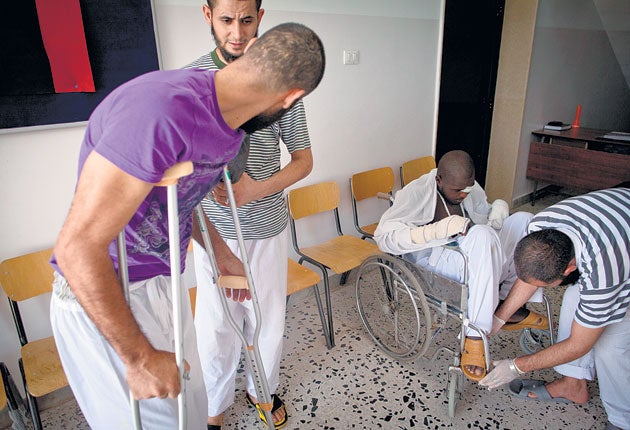'We fight for Muammar. We fight for Libya. He protected our country'
To the West, Gaddafi's defeat is inevitable, but his hired guns are still fervently loyal – even the injured ones

"No-one likes being bombed by foreign countries. They bombed us for six months and they are still bombing us. Even after they put their puppets in Tripoli. We fight for Muammar, he protected our country: we fight for Libya".
In reality, Amr Abdullah Jawad, 22, was in no state to fight Nato or anyone else, lying in a ward at the central hospital in the Libyan capital. His right leg was in plaster after an operation to extract shrapnel, an injury he received while involved in street fighting in the Abu Salim district nine days ago. His defence of Gaddafi faded when the nurse came. "I want the country to be united," he said, turning to face the wall.
Others, however, continue to fight for the regime. Two weeks after Tripoli fell to the revolutionaries, in what should have been the end to this vicious civil war, stubborn pockets of resistance continue at Sirte, Bani Walid, Sabah. The Libyan dictator and his family remain elusive with differing rumours of their whereabouts being spread by members of the opposition's Transitional National Council.
Yesterday, Gaddafi made his latest broadcast, denying he was in a convoy, supposedly laden with gold and guns, which disappeared in a cloud of dust across the border into Niger. His enemies, he charged, were "intruders, they are mercenaries, they are stray dogs. The youths are now ready to escalate the resistance against the rats in Tripoli and to finish off the mercenaries."
To most people, Libyans and outsiders, this was the ranting of a desperate megalomaniac. But there is also the feeling that the longer the dictator and his sons remain free and able to deliver his messages, however removed from reality they may be, it gives heart to the ultra loyalists among his followers.
Members of revolutionary hierarchy had held that Gaddafi was a low priority for the new government, with its hands full of having to concentrate on introducing governance and repairing broken infrastructure. "That is wrong, he is able to say whatever he likes and some people believe him," said Mohammed Ilyas Badri, manning a checkpoint outside Bani Walid.
"We should capture him, put him in a cage and put it on television. That is the only thing that will convince some of these people [in Bani Walid] he is finished, otherwise this will carry on."
A little later came a salvo of a dozen Grad rockets from the supposedly besieged town, causing little damage, but showing that the loyalists retain weaponry and are in no mood to give up. Saif al-Islam, Gaddafi's son, was back in Bani Walid rallying cadres, said an elder from the town.
Moftar al-Rubessi looked unhappy and weary. Two days ago he was among a party of Bani Walid residents who arrived at Wishtata to hold talks with the rebels on surrender. The negotiations had been on satellite television watched inside the town and the delegates had to abandon their journey home when their cars came under fire.
"There are around 200 Gaddafi men inside Bani Walid and they are preventing a peaceful solution," said Mr al-Rubessi. They are not foreign mercenaries, large numbers of whom have been supposedly fighting for the regime, but Libyans. "These people have blood on their hands. They had opened fire on a protest march and killed innocent people. They are afraid of justice. We hoped that maybe they had left in the convoy, but they are still there."
The departure in the convey of hundreds of fighters from what is left of Gaddafi's forces should, in theory, hasten the end of further strife. But, all the indications are that those still fighting are locals rather than foreigners.
"Most of what they call the mercenaries had begun to disappear after the rebels entered Tripoli, although some of them fought alongside us in Bab al-Aziziya [Gaddafi's fortress] and here at Abu Salim," said Ahmed Mahmood Salhouddin, serving, until eight days ago, as a captain in the Libyan army.
"I think the fighting in Tripoli is now over. But you go to Sirte, to Sabbah, and it is a different story. Those are his people, those tribes did well out of Gaddafi and it is their duty to stand by him."
The revolutionaries in Tripoli say they do not want to make the mistake of the "de-Baathification" programme introduced in Iraq, which fatally weakened the security apparatus and played a part in driving former soldiers and police to join the insurgency.
Captain Salhouddin can, under this promise, join the new national army when it is formed. But, he says, he is prepared to wait. "I'll wait and see what the changes are like. I do not have anything to fear, I have just fought against people we were told were al-Qa'ida."
Some of Captain Salhouddin's neighbours in Abu Salim regard the changes with foreboding. "We had safety under Muammar Gaddafi, we had jobs and food. People forget how poor this country was and he made sure that not just the rich got the money from the oil," said Um Hania, a 63-year-old former teacher.
Captain Salhouddin also saw trouble ahead. "This is something I heard near the end. The Gaddafi people will go across the borders and wait. They have money, they have taken weapons from the arms dumps. Nato will have to stop their air attacks soon. Then these people will come back and start the real war, we are going to have another Iraq."
Subscribe to Independent Premium to bookmark this article
Want to bookmark your favourite articles and stories to read or reference later? Start your Independent Premium subscription today.

Join our commenting forum
Join thought-provoking conversations, follow other Independent readers and see their replies